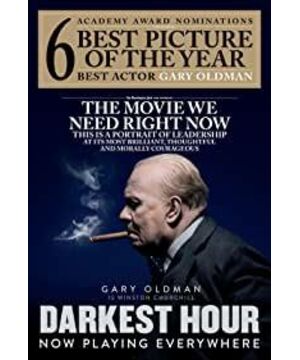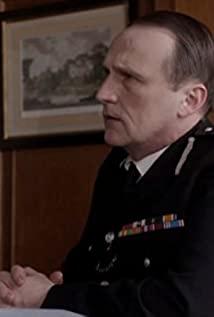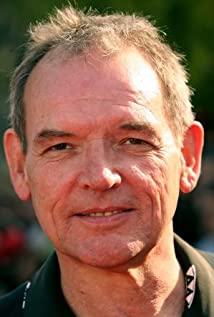——Winston Churchill
"Churchill" is a biographical film, shot around Churchill, focusing on showing the other side of the great man, the interception time period is a few days before the D-Day landing in Normandy in June 1944. Churchill in the movie was an alcoholic, smoker, irritable, irritable, and unreasonable. A tragic experience in the First World War left a lasting pain in Churchill's heart. In the famous Battle of Gallipoli in 1915, Churchill's Bosphorus landing failed miserably, the British and French forces and allies Australia and New Zealand The Legion suffered heavy casualties and Churchill was relieved of the position of Lord Admiral. In the eyes of Churchill, the Normandy landing plan in World War II seemed to be a repeat of history. How could he not be frightened? For a while, Churchill was anxious and worried because he was afraid that the landing operation would fail, and fell into the "self-torture" of inner struggle. Action, and made a "stupid act" of praying to God for bad weather, and for a while and mother-in-law tried to interfere with the commander-in-chief Eisenhower, which became "unreasonable". The film restores the ordinary side of this great man in history. The shadow behind the sun is long, and everything is presented in the most realistic way, without beautification, without hiding, and logical.
Success is not the end, failure is not the end, only courage is eternal.
--Winston Churchill
"Dunkirk" is a war film by the god-level director Nolan. The interception period is two weeks from May 26, 1940 to June 4, during the Dunkirk retreat. The film is an innovation that is different from previous war films: that is, different from the panoramic shots of Hongdae used in old classics such as "The Longest Day" (D-Day, 1962), "Distant Bridge" (1977), It is also different from the popular shooting method of focusing on small people and reflecting big events in the past two decades, replacing panoramic shooting with details. Representative works such as "Saving Private Ryan" (1998), "Titanic" (1997). "Dunkirk" divides the structure of the three-layer image of sea, land and air. The characters are quite vague, the storyline is not prominent, it is not laboriously sensational, and the feelings are not prominent. Such shooting has left many viewers puzzled and disappointed, thinking that the storyline is dull and boring. Isn't that what war really is? The actors in the film are not the point, the plot is not the point, the scene is not the point, there are no tricks and skills, only pureness is left, just comprehend. The film abandons feelings, logic, politics, and doctrine. There is no climax, no story conflict, and only a straightforward narrative. There is no stormy heroism and sensationalism in the film, no chicken soup for the soul of Wei Zhengguang's political correctness, and no compassionate perspective of God. What does the film "Dunkirk" have to do with Churchill? In fact, it doesn't. The film only arranges Churchill's famous speech "Fight to the End" on June 4, 1940 as a voice-over at the end.
All I can offer is blood, hard work, tears and sweat.
--Winston Churchill
"Darkest Hour" is also a biographical film. It was filmed around Churchill, showing Churchill and the cabinet council at that time in a multi-layered and comprehensive manner. The interception time was from May 10, 1940, when Churchill was appointed as the Prime Minister of the United Kingdom in danger to June 4, 1940. The evacuation of Dunkirk is over. In May 1940, under the attack of Hitler's lightning artillery, European countries fell one after another. Chamberlain's policy of appeasement failed completely, and he was forced to resign as prime minister. Churchill was appointed to the Downing Palace and formed a wartime cabinet. At that time, the German army had surrounded 400,000 British and French troops in Dunkirk, and it seemed that they were on the verge of annihilating the European continent. His responsibilities are of the greatest importance, and the test he faces is no longer arduous. Churchill in the film has both the style of the great man and the flaws of the mortals: he is irritable, loses his temper, has erratic emotions, hurts people, is not likeable, has many enemies, and exaggerates a little: he never leaves his mouth, smokes, and chatters. He's rambling, and his ideas are changing, (sarcastically by his colleagues as having a hundred ideas a day, four of which are wise, and the rest are dangerous). This seems to have pulled Churchill off the "altar". He looks more like a mundane person with many shortcomings. How can there be greatness at all? Isn't this the will of God? Doesn't this show the justice of God? The more outstanding the talent is, the more flawed it is. How can a mediocre person have such a prominent flaw? Churchill's bad side aside, what do we see? Churchill has astonishing insight, extraordinary overall situation and foresight, he has strategic talent in all directions, does not succumb to politically correct pragmatism, and flexible diplomacy. He has the unyielding will to fight and the firm confidence to win. Are these not enough? These excellent qualities are enough to make him an outstanding historical figure. In those times when life and death are at stake, is it a peace or a decisive battle? Is it time to break the boat and fight to the end? Or should we sign a contract to keep England? Where should I go from here? Churchill faced dangers and difficult choices. A little careless, will fall into the British Empire and become the eternal sinner of the nation. The results of history have proved that Churchill defied all opinions at that time and was determined to "do not make deals with tigers or make deals with the devil" was completely correct. He turned the tide and led the British people to victory in World War II. The best result is the best description.
View more about Darkest Hour reviews











